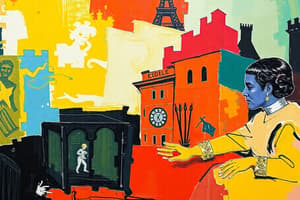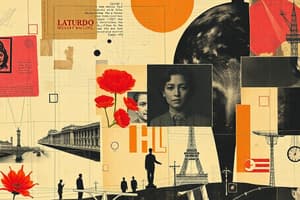Podcast
Questions and Answers
What is a defining characteristic of Romanticism in literature?
What is a defining characteristic of Romanticism in literature?
- Ironical representation of reality
- Exploration of the human psyche and psychological depth
- Emphasis on emotion and nature (correct)
- A focus on societal norms and everyday life
Which theme in English literature often explores the juxtaposition of the individual against societal expectations?
Which theme in English literature often explores the juxtaposition of the individual against societal expectations?
- Conflict and War
- Identity and Alienation (correct)
- Love and Relationships
- Nature and the Environment
In literature, which technique involves using descriptive language to create sensory experiences?
In literature, which technique involves using descriptive language to create sensory experiences?
- Irony
- Metaphor
- Imagery (correct)
- Symbolism
Which literary movement is characterized by an interest in dream-like experiences?
Which literary movement is characterized by an interest in dream-like experiences?
What type of literature includes essays and biographies focusing on real-life events?
What type of literature includes essays and biographies focusing on real-life events?
Which of the following is NOT a common theme reflected in English literature?
Which of the following is NOT a common theme reflected in English literature?
Which characteristic is primarily associated with the Renaissance period of English literature?
Which characteristic is primarily associated with the Renaissance period of English literature?
Which notable work is associated with the Victorian Era?
Which notable work is associated with the Victorian Era?
Which author is known for their contribution during the Modernism period?
Which author is known for their contribution during the Modernism period?
What is a defining characteristic of Postmodernism in literature?
What is a defining characteristic of Postmodernism in literature?
Which period is characterized by the emergence of the novel and satire?
Which period is characterized by the emergence of the novel and satire?
Which notable author is associated with the Romantic Period?
Which notable author is associated with the Romantic Period?
What major theme is reflected in the literature of the Victorian Era?
What major theme is reflected in the literature of the Victorian Era?
Which work is considered a hallmark of the Old English period?
Which work is considered a hallmark of the Old English period?
Flashcards are hidden until you start studying
Study Notes
Overview of English Literature
- Definition: Literature written in the English language, encompassing various genres, forms, and periods.
- Historical Context: Reflects cultural, social, and political themes across different eras.
Major Periods of English Literature
-
Old English (450-1150)
- Characteristics: Oral tradition, epic poetry.
- Notable Works: "Beowulf".
-
Middle English (1150-1500)
- Characteristics: Development of dialects, influence of Norman French.
- Notable Works: Geoffrey Chaucer's "The Canterbury Tales".
-
Renaissance (1500-1660)
- Characteristics: Flourishing of arts and humanism; emphasis on individualism.
- Notable Authors: William Shakespeare, John Milton.
- Notable Works: "Hamlet", "Paradise Lost".
-
Restoration and 18th Century (1660-1798)
- Characteristics: Satire, rise of the novel, enlightenment thought.
- Notable Authors: Jonathan Swift, Daniel Defoe.
- Notable Works: "Gulliver's Travels", "Robinson Crusoe".
-
Romantic Period (1798-1832)
- Characteristics: Emotion, nature, individualism, and the supernatural.
- Notable Authors: William Wordsworth, Samuel Taylor Coleridge, Lord Byron.
- Notable Works: "Lyrical Ballads", "Don Juan".
-
Victorian Era (1832-1901)
- Characteristics: Social reform, realism, and moral complexity.
- Notable Authors: Charles Dickens, George Eliot, Thomas Hardy.
- Notable Works: "Great Expectations", "Middlemarch".
-
Modernism (1901-1945)
- Characteristics: Experimentation with form, stream of consciousness, fragmented narratives.
- Notable Authors: Virginia Woolf, James Joyce, T.S. Eliot.
- Notable Works: "Ulysses", "The Waste Land".
-
Postmodernism (1945-Present)
- Characteristics: Playfulness, metafiction, questioning of narratives.
- Notable Authors: Thomas Pynchon, Salman Rushdie, Don DeLillo.
- Notable Works: "Gravity's Rainbow", "Midnight's Children".
Key Genres in English Literature
- Poetry: Structure varies (sonnets, free verse) and themes often include love, nature, and existential questions.
- Drama: Exploration of human conflict and emotion, significant development in tragedy and comedy.
- Fiction: Novels and short stories; themes range from social issues to psychological depth.
- Non-Fiction: Essays, biographies, and memoirs that explore real-life events and commentary.
Notable Literary Movements
- Romanticism: Emphasis on emotion and nature.
- Realism: Focus on everyday life and societal norms.
- Surrealism: Embracing the irrational and dream-like experiences.
Themes in English Literature
- Identity and Alienation: Exploration of self vs. society.
- Love and Relationships: Various interpretations across different periods.
- Conflict and War: Reflection of societal upheaval and human experience.
- Nature and the Environment: Relationship between humanity and the natural world.
Literary Techniques
- Symbolism: Use of symbols to represent ideas or concepts.
- Imagery: Descriptive language that appeals to the senses.
- Irony: Contrast between expectation and reality often used for humor or critique.
Conclusion
- English literature is a rich tapestry of voices and styles that reflect the complexities of human experience, evolving through historical and cultural contexts. Understanding its periods, genres, and themes is essential for appreciating its depth and significance.
Overview of English Literature
- Literature in the English language spans various genres, forms, and historical periods.
- It encompasses cultural, social, and political themes reflective of the times in which it was produced.
Major Periods of English Literature
-
Old English (450-1150)
- Characterized by oral tradition and epic poetry.
- Notable work: "Beowulf".
-
Middle English (1150-1500)
- Development of dialects influenced by Norman French.
- Notable work: "The Canterbury Tales" by Geoffrey Chaucer.
-
Renaissance (1500-1660)
- Flourishing arts, humanism, and emphasis on individualism.
- Notable authors: William Shakespeare, John Milton.
- Notable works: "Hamlet" and "Paradise Lost".
-
Restoration and 18th Century (1660-1798)
- Rise of satire and the novel, influenced by Enlightenment thought.
- Notable authors: Jonathan Swift, Daniel Defoe.
- Notable works: "Gulliver's Travels" and "Robinson Crusoe".
-
Romantic Period (1798-1832)
- Focus on emotion, nature, individualism, and supernatural elements.
- Notable authors: William Wordsworth, Samuel Taylor Coleridge, Lord Byron.
- Notable works: "Lyrical Ballads" and "Don Juan".
-
Victorian Era (1832-1901)
- Emphasis on social reform, realism, and moral complexity.
- Notable authors: Charles Dickens, George Eliot, Thomas Hardy.
- Notable works: "Great Expectations" and "Middlemarch".
-
Modernism (1901-1945)
- Characterized by experimental forms and fragmented narratives.
- Notable authors: Virginia Woolf, James Joyce, T.S. Eliot.
- Notable works: "Ulysses" and "The Waste Land".
-
Postmodernism (1945-Present)
- Features playfulness, metafiction, and questioning of traditional narratives.
- Notable authors: Thomas Pynchon, Salman Rushdie, Don DeLillo.
- Notable works: "Gravity's Rainbow" and "Midnight's Children".
Key Genres in English Literature
- Poetry: Varies in structure, with common themes of love, nature, and existential questions.
- Drama: Explores human conflict and emotion, notable in both tragedy and comedy.
- Fiction: Encompasses novels and short stories addressing themes from social issues to psychological depth.
- Non-Fiction: Includes essays, biographies, and memoirs that examine real events and insights.
Notable Literary Movements
- Romanticism: Centers around emotion and the natural world.
- Realism: Focuses on everyday life and societal conditions.
- Surrealism: Engages with the irrational and dreamlike experiences.
Themes in English Literature
- Identity and Alienation: Investigates the individual’s place within society.
- Love and Relationships: Explores diverse interpretations across eras.
- Conflict and War: Reflects social upheaval and human experiences.
- Nature and the Environment: Examines humanity's relationship with the natural world.
Literary Techniques
- Symbolism: Utilizes symbols to signify deeper meanings.
- Imagery: Employs descriptive language that engages the senses.
- Irony: Highlights contrasts between expectations and reality, often for humor or critique.
Conclusion
- English literature represents a diverse array of voices and styles, portraying the complexities of human experiences shaped by historical and cultural contexts. Understanding its distinct periods, genres, and themes is vital for appreciating its richness and significance.
Studying That Suits You
Use AI to generate personalized quizzes and flashcards to suit your learning preferences.




